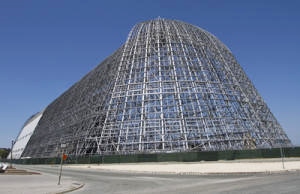 Mountain View, CA – In a deal that promises to restore Moffett Field’s beloved Hangar One, Google on Monday said it would spend more than $200 million to rehab that and two other hangars, create an educational center and assume management for much of the historic air base, drawing cheers from preservationists.
Mountain View, CA – In a deal that promises to restore Moffett Field’s beloved Hangar One, Google on Monday said it would spend more than $200 million to rehab that and two other hangars, create an educational center and assume management for much of the historic air base, drawing cheers from preservationists.
Saying it will use the airfield to conduct research in space exploration, aviation, robotics and other emerging technologies, Google’s subsidiary, Planetary Ventures, also agreed to pay NASA $1.16 billion to rent about 1,000 acres on the site from the federal agency over the next 60 years.
“This is great news,” said Lenny Siegel, a longtime community activist who has fought to save Hangar One, which was built in 1931 to house naval airships and was closed in 2003 after tests revealed toxic chemicals were leaching from its roof. The hangar’s chemical-laden skin has since been removed. “We finally have assurance that Hangar One will be re-skinned, Moffett Field’s facilities will be put to scientific use and there will be a community-oriented educational center.”
Under the deal, NASA plans to continue operating its Ames Research Center at Moffett Field and other groups — including the California Air National Guard — will remain there with no change in their operations.
Advertisement
Mountain View Mayor Chris Clark said residents had worried that if other agencies or perhaps an air-cargo business had taken over the field, the number of flights over the community might drastically increase.
“It’s a major win,” Clark said. “When I step back and look at what could have happened before Google stepped in, it really is the best possible outcome we could have had.”
A NASA news release announcing the lease provided few details about what sort of improvements Google planned to make on the field, which includes the three hangars, two runways, a flight operations building and a golf course. It noted that the public educational center promised by the Mountain View-based company will “explore the site’s legacy and the role of technology in the history of Silicon Valley.”
Federal officials previously had described that center as a 90,000-square-foot structure that would serve as a “public benefit educational/museum/incubator.” However, it’s unclear how much if any of the $200 million that Google will spend on improvements would be used for that facility and where at Moffett Field it would be located.
Google already has a significant presence at Moffett Field. Its founders, Larry Page and Sergey Brin, have a fleet of jets parked at Moffett, and the company has a separate long-term lease to build a planned office campus on 42 acres there. It also hopes to build classrooms, labs and possibly housing on another Moffett Field site leased by a coalition of local colleges, and it is using the field to test drive advanced versions of its self-driving automobile.
“We look forward to rolling up our sleeves to restore the remarkable landmark Hangar One, which for years has been considered one of the most endangered historic sites in the United States,” said David Radcliffe, a Google vice president, in NASA’s news release. But the company declined to comment further.
Monday’s announcement cemented an agreement first announced in February. NASA said the lease will save it $6.3 million a year in maintenance and operating costs.
“We want to invest taxpayer resources in scientific discovery, technology development and space exploration — not in maintaining infrastructure we no longer need,” the agency’s administrator, Charles Bolden, said in the release.
Not everyone was enthusiastic about the technology company’s new role at Moffett Field.
“The lease gives Google unprecedented control of a federal facility to use as its own playground,” complained John Simpson of the advocacy group Consumer Watchdog, a long-standing critic of Google.
But others hailed the news, particularly because it appears to finally rescue Hangar One.
“It sounds phenomenal if they are going to restore that,” said Cindy Heitzman, executive director of the California Preservation Foundation. “It’s historically significant.”
Congresswoman Anna Eshoo, D-Palo Alto, agreed.
In a statement issued by her office, she called the lease “a major win for our region and our country.”
